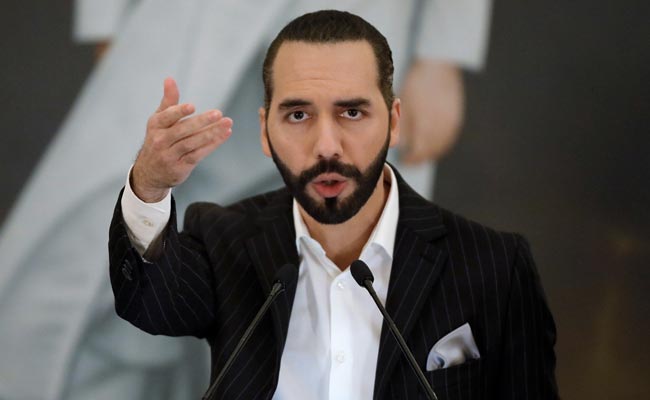
El Salvador’s feared gangs have claimed the lives of an estimated 120,000 civilians over three decades.
San Salvador:
Fireworks were set off in El Salvador’s capital on Sunday as gang-busting President Nayib Bukele claimed to have won re-election with more than 85% of the vote: “a record in the entire history of world democracy”.
Bukele, 42, has emerged in opinion polls as the most popular leader in Latin America and around the world, as a war against gangs has sharply lowered the homicide rate in a country weary of violence.
“According to our data, we won the presidential election with more than 85 percent of the vote,” he said on X (formerly Twitter) two hours after polls closed and before the official results were announced.
Hundreds of people gathered in the central square cheering and whistling in celebration as fireworks were set off in different parts of San Salvador.
“We are very happy with this victory: we will have Bukele for another five years,” Lorena Escobar, a 38-year-old nurse, told AFP.
El Salvador’s government says feared gangs have claimed the lives of some 120,000 civilians over three decades, adding that when Bukele came to power in 2019, criminal gangs controlled 80% of the country.
Under a state of emergency imposed in March 2022, his government rounded up more than 75,000 gangsters – real and suspected.
Last year, the murder rate in what was once one of the world’s most dangerous countries plummeted to its lowest level in three decades and is well below the global average.
Bukele also claimed that his New Idea party won 58 of the 60 seats in the Legislative Assembly, according to the president’s X post, which ended: “God bless El Salvador.”
“Gang Cancer”
Shortly after Sunday’s vote, Bukele dismissed criticism of his rights record and boasted that he had cured the “cancer” of gangs in the Central American country.
“Why do we have the highest incarceration rate in the world? Because we… turned the murder capital of the world, the most dangerous country in the world, into the safest country in the Western Hemisphere,” he said.
“The only way is to arrest all the murderers.”
Activists say many innocent people – including minors – are caught in a dragnet, held in inhumane conditions and even tortured.
Thousands of people were incarcerated in a brand-new prison, the largest in the Americas, built by the president in a matter of months.
“We had surgery, we are doing radiation, we will leave in good health and without gang cancer,” Bukele insisted, accusing Westerners of trying to impose their “ideas of liberal democracy” on El Salvador. .
‘dictator’
Bukele’s candidacy was itself controversial because of a loyalist Supreme Court ruling that allowed him to bypass a constitutional ban on consecutive terms.
Asked on Sunday whether he would change the law to seek a third term, the president responded: “I don’t think there’s a need for constitutional reform.”
He has not made it clear what his future plans are.
Ironically, Bukele, who adopted the “dictator” moniker sometimes used to describe him, urged Salvadorans to vote en masse “so that we have a legislative assembly that can continue to ratify the state of emergency.”
In December, an Amnesty International report warned of “state violence gradually replacing gang violence”, citing arbitrary arrests.
But for most Salvadorans, this doesn’t seem to be too pressing an issue.
“Things were bad before,” said Sandra Burgos, 68, who recently opened a small bookstore in La Campanera. La Campanera is a once notoriously violent neighborhood in San Salvador that was divided into no-go areas during the gang-dominated era.
“Now we’re fine. We can move around…that wasn’t possible before.”
“State violence”
Concentration of power is another issue, and the Bukele-aligned legislature has replaced top judges and the attorney general — both of whom have clashed with Bukele.
There are also concerns about growing hostility towards critics and independent media, as well as a lack of transparency in public accounting.
El Salvador’s troubled economy will be a major challenge for Bukele in his second term, with high public debt and the president’s use of taxpayer money to invest in Bitcoin widely seen as a failed strategy.
According to the United Nations Economic Commission for Latin America and the Caribbean, nearly 30% of Salvadorans will live in poverty by 2022.
Voting in El Salvador is not compulsory and turnout in 2019 was just over 50%, with Bukele winning in the first round with 53% of the vote.
(Except for the headline, this story has not been edited by NDTV staff and is published from a syndicated feed.)
Follow us on Google news ,Twitter , and Join Whatsapp Group of thelocalreport.in